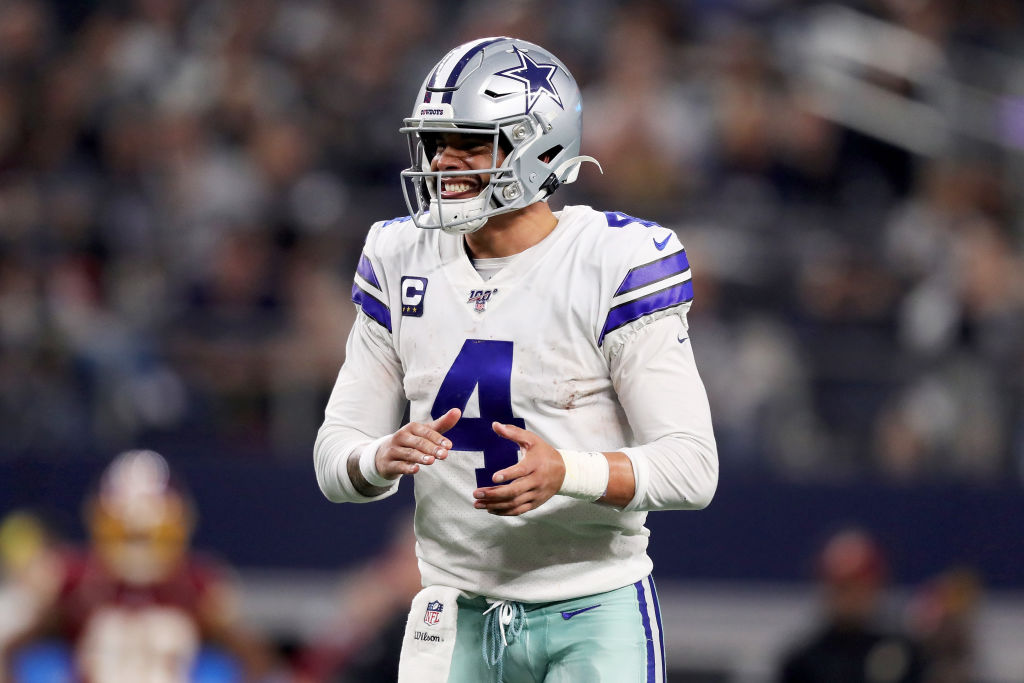NFL
Dak Prescott Just Made $30 Million and Maybe Lost a Great Receiver

What’s left for Dallas Cowboys fans to talk about in the NFL offseason now that the team has placed the franchise tag on Dak Prescott? Well, there’s always the question of whether the 26-year-old quarterback with 67 consecutive starts in the regular season and playoffs will show up for training camp.
The Cowboys’ decision on Prescott was widely expected since the two sides couldn’t agree on a new contract, but it nevertheless became one of the headlines Monday as the NFL started moving forward to the 2020 season.
Here are some key takeaways from the deadline day for teams to determine whether they will use the franchise tag for the upcoming season.
Quarterbacks and receivers are expensive, with or without contracts
The Dak Prescott situation was one of the storylines dominating the offseason because quarterbacks are a special category in sports. Unless a team sneaks its wildcat package onto the field, every offensive play begins with a snap to the quarterback. And that play often ends with the QB throwing the ball in someone’s direction – often a wide receiver.
NFL teams and their top talents would rather work out long-term deals than resort to the franchise tag, which carries with it a one-year contract at a predetermined salary. Long-tern contracts provide the player with security and the team with stability.
The decision by Dallas to apply the tag to Prescott will set his 2020 salary at approximately $31.5 million and now leaves the Cowboys without any assurance that they will be able to retain receiver Amari Cooper, who’s about to hit the free-agent market.
Prescott, who threw for 4,902 yards and 30 touchdowns in his fourth season, can’t be happy that his own negotiations on a longer deal could now drag out to the July 15 deadline and will be even more upset in another team scoops up Cooper, who caught 79 passes for 1,189 yards and eight touchdowns in his first season as a Cowboy.
One big-name receiver who did get the franchise tag was A.J. Green. As expected, the Bengals will lay out approximately $18 million to keep Green, 31, who missed half of 2018 with a foot injury and all last season with ligament damage to his left ankle.
Whereas the Cowboys’ handling of their QB situation was expected, it wasn’t a certainty what the Tampa Bay Buccaneers would do with Jameis Winston. The prevailing opinion was that the Bucs were serious about letting him try free agency after a season in which 33 TD passes were more than offset by the damage from 30 interceptions, but that wasn’t locked in until linebacker Shaq Barrett was hit with the franchise tag Monday.
Barrett comes close to quadrupling the $4 million he made on a one-year free-agent deal with Tampa Bay, but he could have reasonably hoped for more security after 19.5 sacks and 58 tackles last season.
Defenders are getting the franchise tag, too
After quarterbacks and wide receivers, defenders are the most expensive players when it comes to applying the franchise tag, with the 2020 guarantees all projected to be between $16 million and $18 million. That doesn’t stop teams from writing those checks for top talent.
One of Monday’s bigger developments on that side of the ball was the Kansas City Chiefs ending the suspense by tagging Pro Bowl defensive tackle Chris Jones, who has 33 sacks in four seasons as one of the cornerstones of the Super Bowl champions. Jones is 25 years old and an obvious candidate to negotiate a longer deal with the Chiefs before the July 15 deadline.
The New York Giants used their franchise tag on defensive end Leonard Williams for around $16 million. They invested heavily in Williams midway through last season, acquiring him from the New York Jets for third- and fifth-round draft picks, and didn’t get great production from him on the field. The front office may be banking on Williams getting to the quarterback with greater frequency once they repair a secondary that was so easily picked apart.
Linebackers being tagged were Bud Dupree by the Pittsburgh Steelers and Matt Judon by the Baltimore Ravens. Dupree’s future in Pittsburgh was in doubt until he came through with 11.5 sacks in his fourth season. Judon had a career-high 9.5 sacks in 2019
Other defenders receiving the franchise tag were Denver Broncos free safety Justin Simmons and Jacksonville Jaguars defensive end Yannick Ngakoue.
Derrick Henry gets a franchise tag
With quarterback Ryan Tannehill agreeing to a contract with $62 million in guaranteed money over the weekend, the Tennessee Titans placed the franchise tag on running back Derrick Henry, 26, in a move that will cost approximately $12.5 million. Henry led the NFL with 1,540 rushing yards last season and tacked on 446 more in three playoff games.
Others on offense being tagged included Los Angeles Chargers tight end Hunter Henry, who has missed 20 of 32 games over the past two seasons, and Washington Redskins guard Brandon Scherff, who has missed 15 games over the past three seasons.











